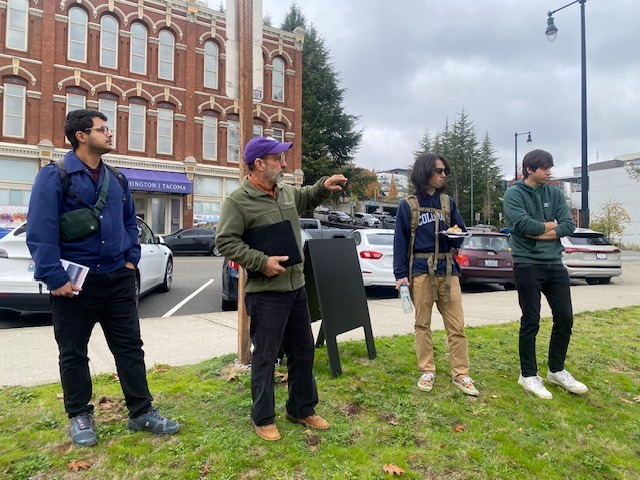Published on November 26, 2024

Research-to-Action Teams 2024-25
In April of 2024 two teams were selected for participation in the second cohort of the Research to Action Collaboratory. For 18 months Urban@UW will work with these teams to provide seed funds, dedicated time to building team cohesion and collaboration skills, and opportunities for peer support, shared resources, and learning. These two project teams also have the chance to learn from the inaugural RAC cohort, whose projects are ongoing.
Strengthening Green Stormwater Infrastructure Through Community Initiatives
This project aims to collect site-specific data at one of the few large-scale green stormwater infrastructure projects in South King County. It is significant for two reasons: it models how other cities might implement sustainable, community-inspired stormwater management solutions and is part of a community garden project serving a refugee-immigrant population in the United States’ sixth most culturally diverse city. World Relief Western Washington (WRWW), the state’s largest refugee resettlement and service agency, manages the garden project.
The City of Kent, Washington, has a long history of flooding. A growing population and increased intense rain events have exacerbated existing challenges. The green stormwater infrastructure at the acre-plus Paradise Gardens, the aforementioned community food project, utilizes five rain gardens, a 2,300 sqft bioswale, and 20,000 gallons of rainwater catchment to divert water away from flood-prone areas. However, despite the project’s ability to divert over 1 million gallons of stormwater each year, the City of Kent’s utility fee system does not acknowledge the garden’s value in helping to manage city stormwater with stormwater credits. This project will engage multiple faculty and students collaborating with the World Relief Western Washington Resiliency Program to provide data to the City of Kent for Paradise Gardens. This collaboration will not only empower the project to receive stormwater credits to offset the cost of green infrastructure, it will also indicate how other cities could implement innovative greenwater solutions.
Project Team:
- Heidi Gough, Associate Professor, School of Environmental and Forest Sciences. UW Co-lead
- Sameer Shah, Assistant Professor, School of Environmental & Forest Sciences at UW. UW Co-lead
- Amy Kuhl, WRWW Resiliency Program Manager
- Lucas McClish, WRWW Community Garden Coordinator. Community Lead
- WRWW Youth Project Intern
Creating an Urban Microforest at UW Tacoma
This project aims to create an urban microforest on the University of Washington’s Tacoma (UWT) campus. The City of Tacoma, WA, has only a 19% tree canopy, leading to poor health outcomes due to dirty air, increased temperature, and a greater susceptibility to heat islands during extreme heat events. Further, the areas of the city with the least tree canopy (as low as 3%) are also the parts most impacted by structural racism and other inequalities. The microforest will improve air quality, combat the heat-island effect, and re-establish diverse ecosystems within the urban landscape.
This microforest project applies existing knowledge to a present issue in downtown Tacoma; it also presents students, researchers, local government, and community members with opportunities to research, learn, and apply new knowledge that can serve us further in the coming years. In collaboration with students and, particularly, members of Cedar Circle, UWT’s indigenous student group, the project will include creating interpretative materials and programming that leverage the site as a public memory and current indigenous presence. As a collaborative, community-engaged project, the siting of micro-forest on the UWT campus leverages partnerships with Tacoma’s Urban Forestry Program, the Tacoma Tree Foundation, and the University of Washington’s Tacoma campus.
Project Team:
- Rubén Casas, Assistant Professor, Culture, Arts and Communication, University of Washington, Tacoma. Faculty Lead, Urban@UW Urban Environmental Justice Initiative. UW Co-Lead
- Mark Pagano, Professor, School of Engineering and Technology, University of Washington, Tacoma. Community Engagement Lead, UW Community Engagement Initiative. UW Co-Lead
- Rachel Williams, student, School of Engineering and Technology, University of Washington Tacoma
- Ryan Wicklund, student, University of Washington Tacoma
- Lowell Wyse, Executive Director, Tacoma Tree Foundation. Community Lead
- Michael Carey, Urban Forest Program Manager, City of Tacoma
The second generation of RAC teams will gather quarterly to explore, discuss, and build team-specific collaborative supports and project-specific plans. Learn more about how the Research to Action Collaboratory approaches building collaborative capacity, and how you can support it.
Urban@UW- creating multi-sector teams to build cities where everyone thrives.